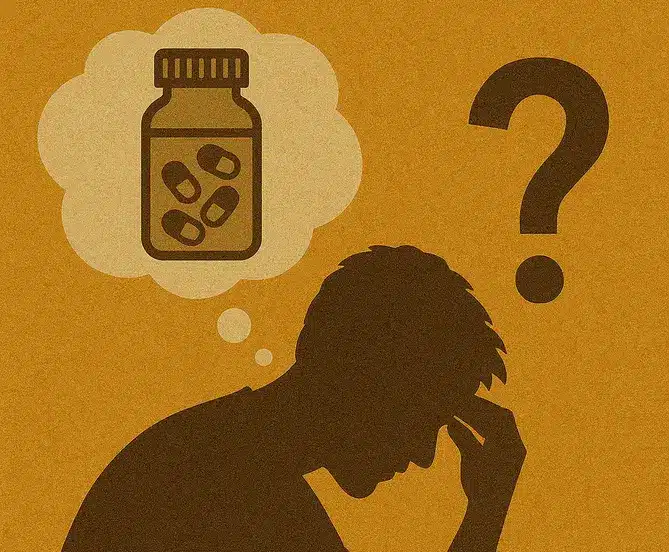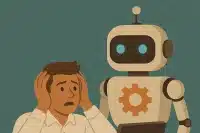The Void That Scrolls
Living with no purpose or higher goals just sucks. It really does. When you have nothing to pull you out of suffering and despair, no north star to help you navigate the grief, pain, misery, and uncertainty of the world, everything feels meaningless. And the world is uncertain—you don’t know what’s going to happen. Without that guiding north star, it just sucks.
This isn’t abstract philosophy. This is lived experience. When you don’t have a larger vision or a way to contribute to society, when you don’t feel like you can make an impact or help people, when you’re not doing something interesting and meaningful, what do you do? You scroll on your phone. You lounge around. You fall into unconscious behaviors. You get riddled with addiction.
Here’s the uncomfortable truth: addiction isn’t really about the substances or behaviors themselves. Addiction is a symptom of having a lack of meaning. You don’t get addicted because of the things themselves. You get addicted because you have nothing better to do—literally nothing you would prefer doing over scrolling, watching, consuming.
Why We Choose The Path Of Least Resistance
This might sound harsh, but it’s true: you could never do something you don’t prefer. You always choose the path of least resistance, or at least the path that you think will make you happiest in that moment. It might not seem like that when you’re stuck in addiction, but you’re always choosing what feels like the safer option in your mind.
When you don’t have a purpose, when you don’t have a goal, the safer option is always going to be this endless array of pleasure and distraction devices that we’ve created as a society. So that’s what you do. You scroll endlessly. You watch videos, movies, reality shows. You get endlessly “inspired” on podcasts. You watch other people live their lives while you just sit there, zoned out, vicariously experiencing emotions through platforms. You’re getting inspiration, feeling fear, excitement, connection—but you’re not the one living the life. You’re watching other people live theirs.
This creates a vicious cycle. The more time you spend consuming, the less time you spend creating. The less you create, the more purposeless you feel. The more purposeless you feel, the more you need to consume to escape that feeling. Round and round it goes, until you’re convinced that life is just suffering and avoidance of suffering is all that exists.
The Conclusion That Feels Like Truth But Isn’t
When you’re deep in addiction—whether it’s video games, binge-watching content, scrolling social media, or even binge-watching spiritual content thinking you’re doing something productive—you can reach a conclusion that feels profound but actually keeps you stuck. Life must just be an avoidance of suffering. That’s it. That is life. The reason anybody does anything is simply to avoid suffering.
But that’s not it. That’s not the end-all, be-all of life. That’s just a phase you go through when you’re stuck without purpose. When you don’t have meaning, when you don’t have goals that pull you forward, life does feel like just avoiding suffering. But that’s a symptom, not a destination.
The solution isn’t to accept that conclusion. The solution is to find meaning. To create meaning. To forge meaning out of life. To make life meaningful. And that seems incredibly difficult when you’re in the depths of purposelessness. Maybe when you’re a little bit out, you can start to accept that it’s possible. But when you’re stuck in addiction, you don’t even believe it’s true. You feel like life is just suffering and avoidance of suffering.
The Catch-22 That Keeps You Stuck
Here’s the frustrating part: it’s difficult to push addictions if you don’t have a purpose. But now I’m telling you to push addictions to find your purpose. That feels like a catch-22. And it is—unless you start with an initial intention that breaks the cycle.
You need to first put your foot in the door and just say: I want to commit to being happy. Again, it’s really difficult, but just say it. I want to commit to being happy. I’m going to make a decision where I’m no longer going to pay the cost of negativity.
But here’s the crucial question: do you actually believe it’s possible? Do you believe that you can live a life rich of meaning and positivity? If the answer is yes, then work can be done. If the answer is no, you might need to cook a little bit longer in the fires of suffering until you’re done paying that cost and decide you’re going to change.
Break the Cycle. Start Moving Forward.
Purpose doesn’t arrive fully formed—it’s built, one choice at a time. If you’re ready to step out of the loop of negativity and start building momentum, channel that intention into meaningful action today.
Take the First Step →The Self-Discovery Process
Once you decide that yes, you want to change, then you learn more about yourself. You cut off these different addictions—push them aside temporarily and look inward. And you’re going to have relapses. That’s normal. But you start with that initial intention of committing to being happy.
As you commit to being happy, ask yourself questions. Introspect on what you actually want as a person. What are your interests? What are your values? What are the types of people you want to help? What are your unique strengths? What can you actually do? What have people told you that you’re gifted at or really good at?
Everybody has something. Don’t think you don’t have something. You have a unique gift. This isn’t positive thinking fluff—it’s just been the case that every person has a unique gift. It checks out over and over again. You have one, undoubtedly. Figure out what that is.
Start ideating and imagining how and what you could do that would fulfill you. Figure out what your core values are. This is probably the most important thing. What do you value? Do you value truth? Beauty? Kindness? Love? Or do you value money, business, achievement? There are value lists you can find, resources that help you identify what matters to you.
What You Dislike Is Equally Important
Finding meaning isn’t just about what you want. It’s also about what you don’t want. Thinking about what type of life you don’t want to live makes things clearer. It reduces the space of possibilities. It helps you find meaning.
What don’t you want to experience? What are the things you just know you don’t want to live life in that way? When you’re clear about what you’re moving away from, it becomes easier to see what you’re moving toward.
This is how you forge meaning. You go inward, do discovery, and pull things out. You see what’s there—what you like, what you dislike. You identify your higher values. And then you connect those values to a contribution you want to make to society.
Why This Matters: Unlocking Higher Levels Of Experience
So why are we doing all of this self-discovery? Here’s the link back to why this is important. When you have a higher value—let’s say truth, or a higher contribution you want to give to society, a mission where you’re doing something that feels really fulfilling and it’s going to help a lot of people or a few people—that doesn’t matter. What matters is your relationship to it.
When you have this, you start unlocking these higher levels of human experience, these states of joy that were just cut off to you before. You didn’t know it was possible when you were in addiction. The reason we’re doing this self-discovery is to access those higher states and to just live a better life—a good life, a life that is your own, that isn’t predicated on the expectations and judgments of other people.
A large part of this is stepping out of fear—the fear that’s inflicted onto you by your society and your environment. When you have purpose, when you have meaning, you have something that’s stronger than that fear. You have a north star that guides you through uncertainty, through suffering, through all the crazy stuff that happens in the world.
From Survival To Transcendence
The goal isn’t to just survive. The goal is to live a life that has some transcendent value or mission. It’s to move from a life of just avoiding suffering to a life of contributing, creating, and experiencing deeper joy.
This requires drawing a line. It requires making a decision that you’re no longer going to live a life predicated on consumption and avoidance. You’re going to live a life predicated on creation and contribution. And that starts with that initial commitment: I want to commit to being happy. I’m going to find my purpose. I’m going to forge meaning out of my life.
The path isn’t easy. There will be relapses. There will be moments when scrolling feels easier than creating. But when you have that north star, when you have that purpose, you have something that pulls you forward even when it’s difficult. You have something that gives meaning to the suffering and makes it worthwhile. You have something that transforms life from just avoiding pain to actively creating something valuable.
Key Takeaway
Addiction isn’t about substances or behaviors—it’s a symptom of lacking purpose and meaning. Without a north star to guide through uncertainty and suffering, people default to endless consumption and distraction. Breaking the cycle requires first committing to being happy, then engaging in self-discovery to identify values, strengths, and a mission that contributes to others. When you have purpose, you unlock higher levels of joy and experience, moving from a life of just avoiding suffering to one of transcendent value. The catch-22 is real—it’s hard to quit addictions without purpose, but you need to quit them to find purpose—but starting with the intention to commit to happiness breaks the cycle.




